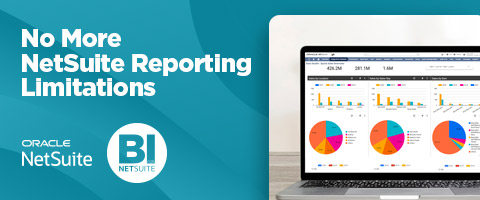Table of Contents:
- Business Intelligence for Executive Team
- Business Intelligence for Finance
- Business Intelligence for Sales and Marketing
- Business Intelligence for Operations
- Business Intelligence for Information Technology (IT)
- Business Intelligence for Human Resources
Wouldn’t it be great if you could get a bird’s eye view of your company’s core business processes without leaving the nest, so to speak? Enterprise Resource Planning (ERP) has great operational reports; however, most of the complex and strategic reporting happens outside of an ERP platform.
It’s a known fact that all departments within a business require thorough reports. From Operations to Human Resources, how a business is doing and how it needs to continue growing is based on extensive analysis of projects, employees, and budget - among other things.
Business Intelligence (BI) designed for ERP software allows you to keep managing core business processes through your Cloud platform all while providing extensive data analysis and reporting right within the software. Whether you’re an executive requiring strategic reports or the head of finance planning the yearly budget, BI is designed for ERP users in all sorts of industries and roles.
Let’s take a look at how BI will help different roles within an organization to improve efficiency, productivity, and most of all, optimize time; because we all know there’s never enough time in the day to do it all.
Request More Info About How How to use Business Intelligence (BI) for NetSuite by User Role
Business Intelligence for C-Suite
Being an executive has its challenges. As the highest point of management there are many tasks that must be handled on a daily basis. Cost, operations, growth - having a clear understanding of the whole organization’s comings and goings is a necessity.
For any executive, staying ahead of the competition is a priority. This requires knowing what opportunities to pursue, what the latest trends are, and most importantly, what customers are buying. And if the economy is any indication, you need to make important decisions in no time. So, what is the solution for all these challenges?
It’s easy enough: Business Intelligence. While ERP systems provide great operational reports for your core processes, it’s BI that enables sales forecasting and full visibility into your business. As someone whose job constantly merges into after hours, you must have complete knowledge of your business operations without blinking an eye.
With Business Intelligence, you can customize your dashboard to showcase the most vital information all within your ERP. How the 3 P’s (People, Processes, Projects) are impacting your business will clearly be visible via your full access to all departmental reports, right at your fingertips.
What’s more, your job requires you to always be thinking ahead, but how can you if you don’t have access to historical data and reports that indicate what’s worked in the past versus what hasn’t. How will you make quick decisions without a strategy or reports?
Business Intelligence takes away the pains of analyzing hundreds of reports and summarizes it all for you within a dashboard on your ERP for quick insight right when you need it most.
Business Intelligence for Finance
As one of the principal users of any ERP, it comes as no surprise that your needs are different to other roles within an organization. In fact, you’ve probably mastered Enterprise Resource Planning and noticed the next step is to optimize data collection and monitoring. When you’re managing budgets, financial forecasts, and deciphering between internal and external financial decisions, all you want is a centralized view and the ability to consolidate and compare data.
Well, with Business Intelligence you can do exactly that. Not only is everything available to you within an ERP, but this tool adapts to your business and gives you more than a couple of ways to analyze data.
From figuring out costs for employee equipment to being in the process of acquiring another company, Business Intelligence allows you to consolidate all your data. In one customizable dashboard, you can optimize your daily finance operations through easy-to-view data visualizations and warehouses.
You will also be able to freely analyze data without going back and forth between multiple platforms, and say goodbye to copious amounts of Excel spreadsheets. In fact, managing budgets and numbers for acquisitions, invoices, and expenses is not only easier to handle, but a lot less time-consuming, especially around tax season.
Business Intelligence for Sales and Marketing
Strategy, strategy, strategy. When it comes to marketing and sales it’s all about strategy, but how do you create a strategy without the goods to back it up? That’s the challenge. In marketing, the key is knowing what campaigns worked and why, what are customers willing to pay, and more specifically who. When it comes to sales, it’s all about targeting the right markets and tracking deals. When these two departments align great things can happen; however, interpreting this data can cause division if not done properly and consistently.
Since marketing and sales are the two departments that are essential to a business’s growth, it’s crucial to have appropriate reporting and data.
With Business Intelligence, you can optimize your reporting needs and then rework and develop the data to allow for more complex analytics.
This analysis will give you insight into everything you need to know to create a strong marketing strategy. You will be able to see what demographics bought the most of a certain product and when. Also, through Business Intelligence you can analyze and explore campaigns that had the most engagement and worked best. Knowing all this will help you move forward with launching successful strategies based on the right demographics, product, services, and more.
Your customized strategy will intertwine with sales where your business development team can view their personal dashboard and monitor the sales journey of prospects in each stage. Business Intelligence will report on data including if a prospect sits in a specific stage longer than other stages, where you can then analyze why.
This also works for both lead generation and sales forecasting. BI will compare these reports and provide you with deep insight into future campaigns, but also what didn’t work and should be scrapped.
Business Intelligence for Operations
There’s nothing quite like managing the day-to-day operations of a business. At the core of these operations is the relationship with customers. Are they satisfied? Is there high customer retention? Yes these questions tie into providing a quality service and/or product, but it also the operational aspect.
By using Business Intelligence, you can easily minimize customer churn by analyzing reports based on customer reviews, product delays, and supply chain management.
Via a customized dashboard, you will have full visibility of all the operations of the business.
Perhaps your warehouse is never on time with deliverables, or your customer service is not providing customers with correct information. You will be able to view this type of data through an Enterprise Resource Planning system and make improvements based on your reports.
Additionally, Business Intelligence will provide you with positive insight on what is working and helping your business grow. Through these reports you can enhance current operations or continue to do what is working. For these situations, complementing your BI product with other ERP customizations like, Supply Chain Management or Boomi.
Business Intelligence for Information Technology (IT)
The branch of Information Technology (IT) is not necessarily one that generates revenue. That being said, it is the most value-added department within an organization. You need to regularly be in-the-know regarding the most cost-effective solution for technology, which not only improves customer satisfaction, but also those of your fellow coworkers. You also need to be strategic through project portfolio and cost management.
Managing technology budgets as well as asset and data management are big projects that are handled both internally and externally.
It’s important for you to know what assets each employee has and keep track of incoming and outgoing employees and their work equipment. You’re also the head of developing efficient programs and technology to fit the needs of your organization.
When it comes to Business Intelligence, this tool is able to keep track of all borrowed and bought assets relating to software, business processes, and employees. It will also give you insight into reports on technology trends to see what is the best fit for the business. Through the project pipeline, you can discover what tasks can be managed internally versus externally. As we grow into a more tech-dependent world, it’s become vital to pick the right software for any fast-growing business.
Business Intelligence for Human Resources
As the face of the company when it comes to recruiting new talent, as a Human Resource representative you’re up against a number of challenges. Firstly, recruiting: finding candidates who fit the requirements, following their interview process, and finally hiring the right person.
Secondly, just as you are responsible for the hiring process, you are also responsible for employee departures. Is there high turnover? Are new hires being productive? What department is in need of new talent? And finally, something that has grown these past few years: company culture. Are employees happy and satisfied? If not, during the exit interview did they mention something that could be improved?
Without a specific business intelligence tool, these challenges are often faced head-on and manually, through analyzing too much data from a lot of different sources. With BI, you are able to have full, clean access to a customized dashboard that displays extensive data visualizations that have intricate information.
For example, you can provide explicit qualities that you require all candidates to have for specific hiring positions. Through Business Intelligence, you will be able to easily weed out those who do not meet that criteria, inviting only candidates who have the right base qualifications into the interview process.
If your company is facing a high turnover rate, you can analyze that data from exit interviews to provide a better understanding and report. This will also help you improve certain aspects in the company and subsequently help with company culture leading to a lower turnover rate. With BI you’re able to streamline the management process and onboarding.
Business Intelligence offers a wide range of solutions across the board, no matter what role you play within an organization. With NetSuite as your homebase, you’re able to optimize your core by taking all that data to create clear and concise reports for all departments. BI will help grow your business in more ways than you can imagine.
Business Intelligence for NetSuite (BI4NetSuite)
In response to our clients’ growing demands for better reporting capabilities, we created BI4NetSuite.
As an integrated solution with NetSuite, you will be able to enhance your data for better comprehensive reports across your organization. Export your data easily to a secure data warehouse, visualize it using your favourite tool (Looker, Tableau, etc), and import those visualizations back into NetSuite as a dashboard.
Learn More About How to use Business Intelligence (BI) for NetSuite by User Role






